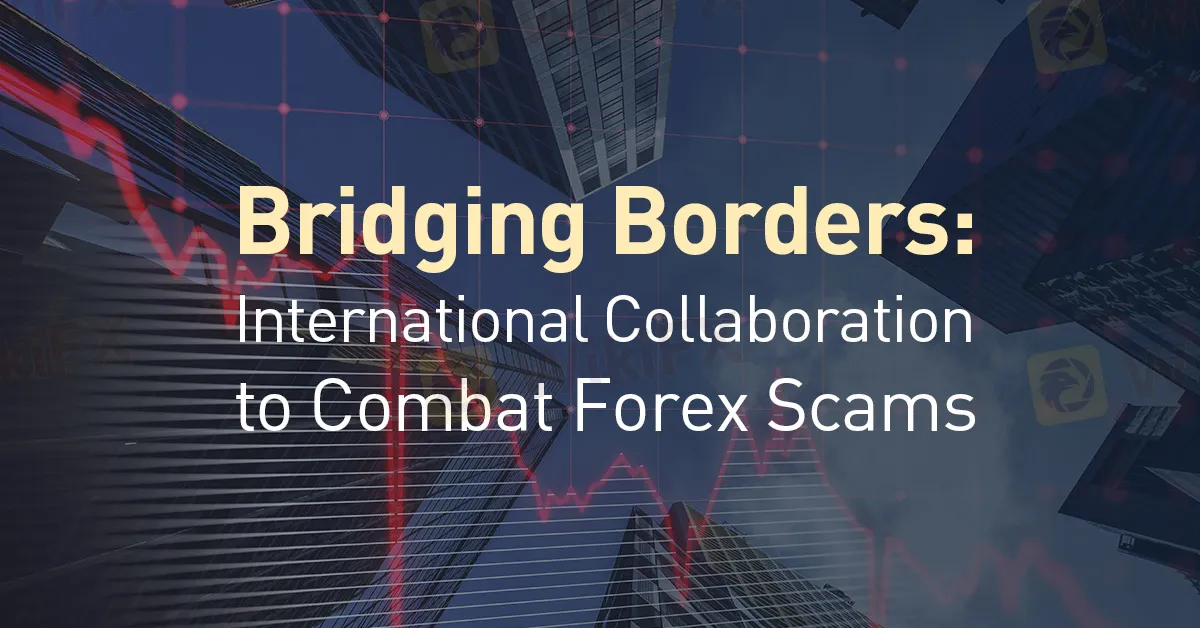简体中文
繁體中文
English
Pусский
日本語
ภาษาไทย
Tiếng Việt
Bahasa Indonesia
Español
हिन्दी
Filippiiniläinen
Français
Deutsch
Português
Türkçe
한국어
العربية
Bridging Borders: International Collaboration to Combat Forex Scams
Abstract:In the interconnected world of forex trading, where borders blur in the digital realm, the battle against scams is a global effort. The United Kingdom and Europe, as integral parts of the international financial network, are not only dealing with domestic scams but also facing the challenges posed by cross-border fraudulent activities. This article explores the collaborative initiatives between countries and international organizations to combat forex scams and promote a unified response to this evolving financial threat.

In the interconnected world of forex trading, where borders blur in the digital realm, the battle against scams is a global effort. The United Kingdom and Europe, as integral parts of the international financial network, are not only dealing with domestic scams but also facing the challenges posed by cross-border fraudulent activities. This article explores the collaborative initiatives between countries and international organizations to combat forex scams and promote a unified response to this evolving financial threat.
The Global Nature of Forex Scams: Crossing Borders Unchecked
Forex scams, facilitated by the borderless nature of online trading platforms, often transcend national boundaries. Scammers exploit regulatory gaps and jurisdictional complexities to operate across multiple countries, making it challenging for individual nations to tackle the issue in isolation.
The Role of Interpol and Europol: Unifying Forces Against Scammers
International law enforcement agencies play a crucial role in the fight against cross-border forex scams. Organizations like Interpol and Europol act as bridges between nations, facilitating information exchange, collaboration, and coordinated efforts to apprehend and prosecute perpetrators. Their initiatives aim to create a unified front against scammers who exploit the global financial system.
Information Sharing: Breaking Down Silos for Swift Action
One of the key challenges in combating cross-border scams is the timely exchange of information between countries. Efforts to break down information silos and establish channels for seamless communication have become integral to the global response. International organizations work towards creating platforms where regulatory bodies from different countries can share insights, trends, and intelligence to identify and neutralize scams more effectively.
Regulatory Harmonization: Aiming for Consistency Across Borders
Harmonizing regulatory frameworks is a crucial aspect of international collaboration. The Financial Stability Board (FSB) and other international bodies strive to encourage consistency in regulatory approaches, making it harder for scammers to exploit regulatory disparities between countries. This harmonization is pivotal in creating a more robust defense against cross-border fraudulent activities.
Public Awareness Campaigns: A Global Call to Vigilance
Educational initiatives, spanning multiple countries, are essential in raising awareness about the risks associated with forex scams. Collaborative efforts between governments, regulatory bodies, and international organizations aim to reach a global audience, empowering traders with the knowledge needed to identify and avoid scams.
WikiFX: A Global Resource for Traders
In the fight against cross-border scams, resources like WikiFX provide a global platform for traders to access information about brokers. WikiFX's comprehensive database includes details on regulatory status, user reviews, and reported scams, contributing to a shared pool of knowledge that transcends national borders.
Visit www.wikifx.com to access WikiFX and join the global community of informed traders.
Conclusion: Forging a Global Defense Against Forex Scams
As forex scams become increasingly transnational, collaboration between countries and international organizations is more critical than ever. By sharing information, harmonizing regulations, and fostering public awareness campaigns, the global community can create a united front against the deceptive practices that threaten the integrity of the international forex market. Platforms like WikiFX, with their global reach, play a vital role in empowering traders with the knowledge needed to navigate the complexities of cross-border trading safely.

Disclaimer:
The views in this article only represent the author's personal views, and do not constitute investment advice on this platform. This platform does not guarantee the accuracy, completeness and timeliness of the information in the article, and will not be liable for any loss caused by the use of or reliance on the information in the article.
Read more

Malaysian-Thai Fraud Syndicate Dismantled, Millions in Losses Reported
The Royal Malaysia Police (PDRM) has received 26 reports concerning the Nicshare and CommonApps investment schemes, both linked to a major fraudulent syndicate led by a Malaysian citizen. The syndicate’s activities came to light following the arrest of its leader by Thai authorities on 16 December.

North Korean Hackers Steal $1.3bn in Cryptocurrency in 2024
Over $2.2bn in cryptocurrency stolen in 2024, with North Korean hackers accounting for $1.3bn. Discover how cyber theft impacts the evolving crypto landscape.

Malaysian Influencer Detained in Taiwan Over Alleged Role in Fraud Scheme
Malaysian influencer Hu Chang Mun, widely known as Ady Hu, has been detained in Taiwan for his alleged involvement in a fraudulent operation. The 31-year-old, who was reported missing earlier in December, was located by Taiwanese authorities after suspicions arose regarding his activities.

Investment Scams in Malaysia: Telegram Tops Scammers’ List
In the first 11 months of 2024, Malaysia recorded 5,685 investment scams, with Telegram emerging as the most commonly used platform for fraudulent activities.
WikiFX Broker
Latest News
ASIC Sues Binance Australia Derivatives for Misclassifying Retail Clients
Geopolitical Events: What They Are & Their Impact?
Top 10 Trading Indicators Every Forex Trader Should Know
WikiFX Review: Is FxPro Reliable?
Trading frauds topped the list of scams in India- Report Reveals
Malaysian-Thai Fraud Syndicate Dismantled, Millions in Losses Reported
Why Do You Feel Scared During Trade Execution?
Revolut Leads UK Neobanks in the Digital Banking Revolution
Fusion Markets: Safe Choice or Scam to Avoid?
SEC Approves Hashdex and Franklin Crypto ETFs on Nasdaq
Currency Calculator



